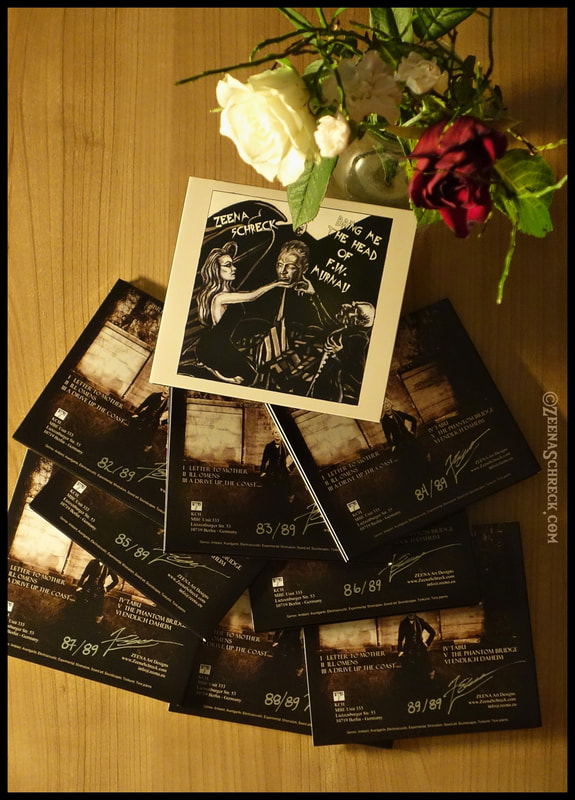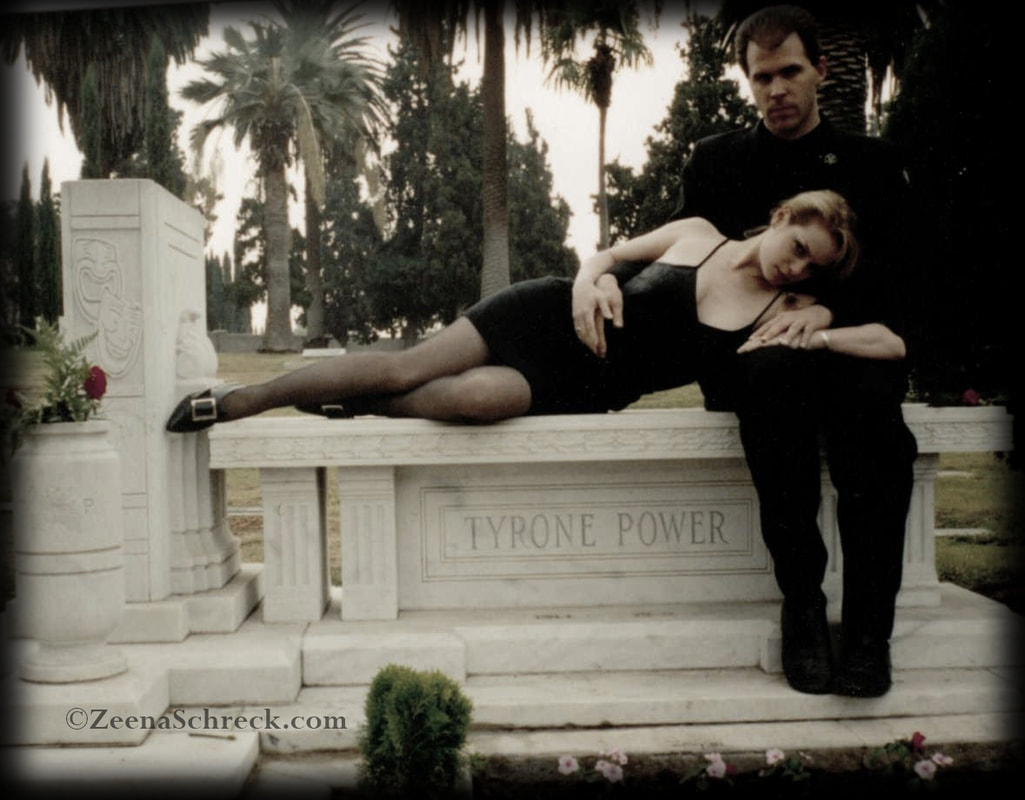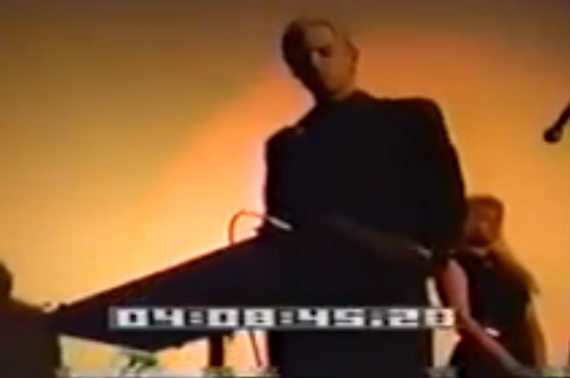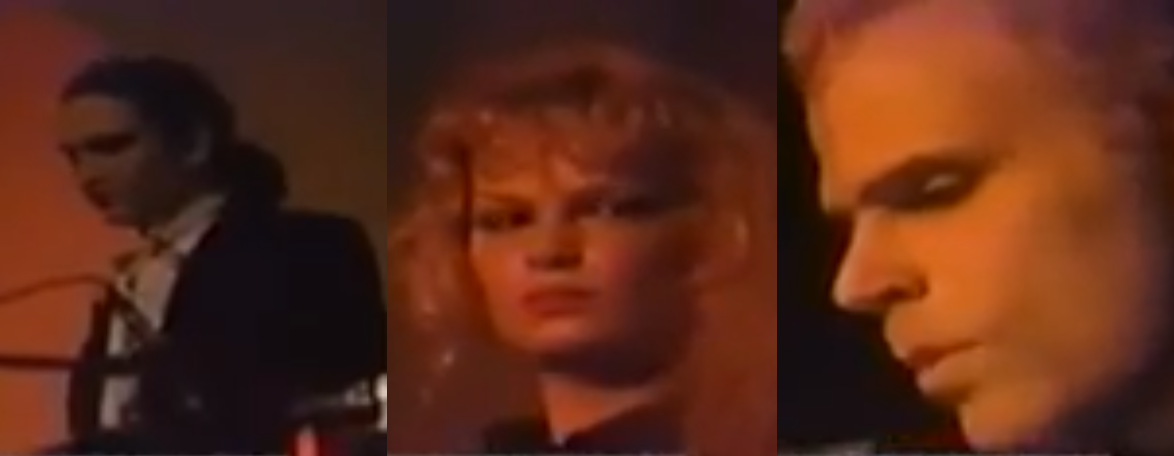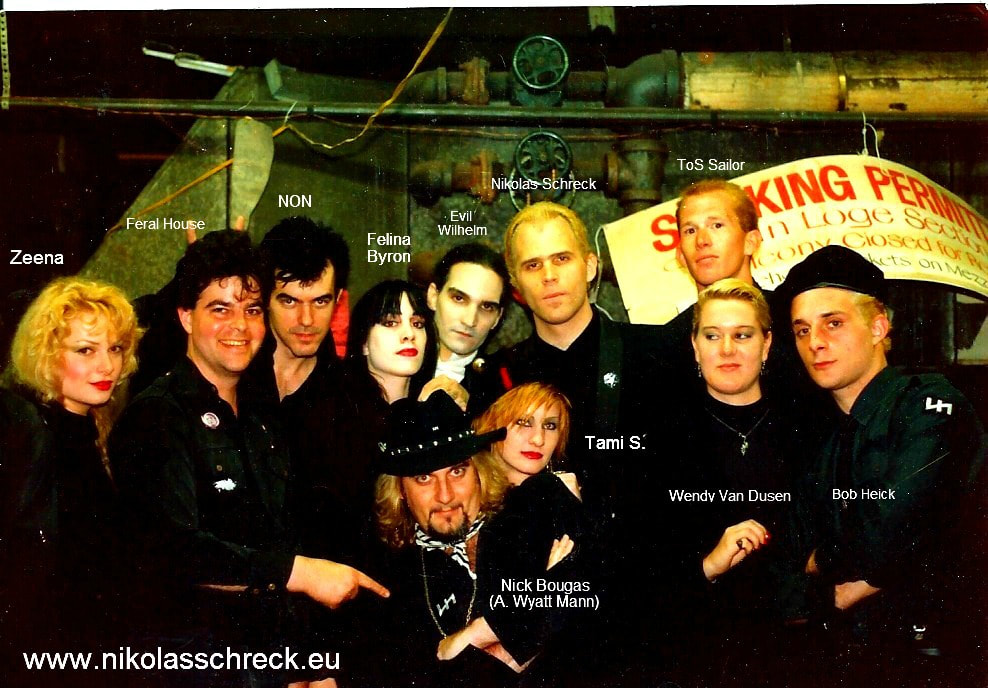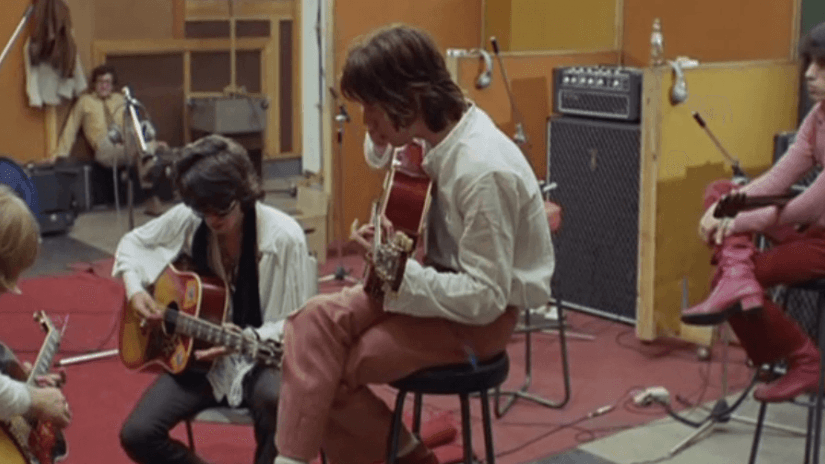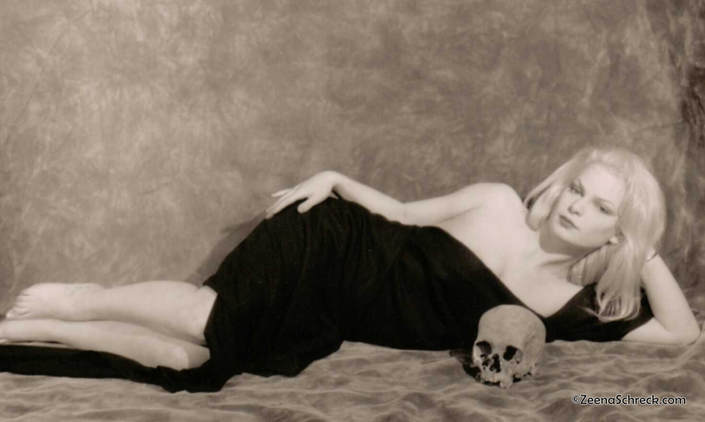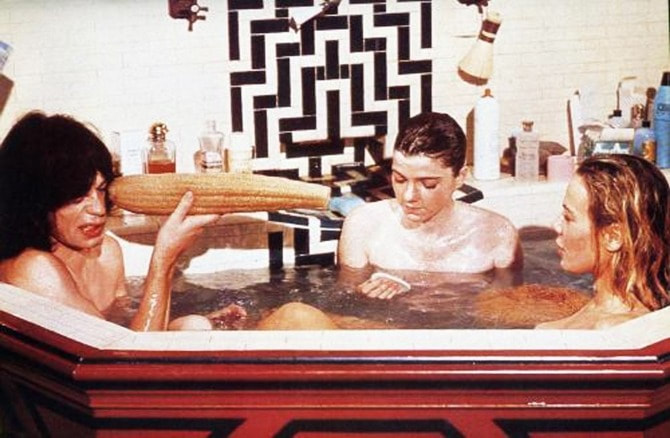Celebrating the 100 year anniversary of F.W. Murnau's classic film Nosferatu:Beginning Friday 4th of March, Bandcamp is waiving their artist fees for 24 hours - a perfect time to order Zeena's first solo release, 'Bring Me The Head Of F.W. Murnau: A Ghost Story in Six Acts,' available at Bandcamp in both digital download or in a digipak CD limited edition (including download code).
About the Album: After a long career in collaborative music activities, this is Zeena Schreck's first entirely solo recording project, placing the collector value of this project in historical context. (To order from Bandcamp, click here or on the picture below.) Released on March 11, 2020, 'Bring Me The Head Of F.W. Murnau: A Ghost Story in Six Acts,' was inspired by news reports that the director's head had been stolen from his grave in Berlin. The tone poems in this recording are sonic necromancy, reflecting the transition from the end of Murnau's worldly life to what his disembodied consciousness may have experienced in the afterlife. Many of the intricate sounds heard in these tracks were captured in field recordings at Murnau's former residence in Berlin and at his grave site in Stahnsdorf, Germany. All music and vocals composed and performed by Zeena Schreck. Genres: Ambient, Avantgarde, Electroacoustic, Experimental, Minimalism, Sound art, Soundscapes, Tonkunst, Tone poems.
For more details on the backstory, and the making of the recording, here's an in-depth interview with Zeena by Nicholas Diak about this recording. To order, click the picture below . [posted by Thomas]
0 Comments
No - sorry, but no - not *that* kind of coming out. :) Lend us your ear, and eyes, and read on... We've both always held the conviction that the public is not owed anything from artists, musicians, authors and other public figures other than their work. Even in this age of social media oversharing, we don't publicly discuss our private lives in great detail. However, due to several recent, obtrusive misunderstandings, it‘s necessary to share that in 2015, after having been separated since 2007, we agreed to amicably divorce. Since then, we've remained on friendly terms and spiritual allies. But because most exes display hostility toward each other as a primitive, dualistic way to signal renewed availability to others, we realize our non-antagonism and continued friendship necessitates this more public clarification. When we first married, in 1988, we considered it a purely a private matter, just between us; a creative and spiritual union which was not bound by conventional standards of matrimony. The actual marriage only became publicly known gradually, months after our private ceremony. So it should come as no surprise that, similarly, we dealt with its dissolution privately, with dignity, rather than making a public spectacle. In recent years, our closest friends knew of our changed marital status (and, yes, despite those who've attempted to reduce our relationship to mere “dates” or “boyfriend/girlfriend” status, in fact we were *legally* married for 27 years). We should have made this clear sooner but we are only human and needed time to work through everything in the most compassionate way. So, kids, there is no drama or soap opera involved, nor any need for boo-hooing. We appreciate your respecting that this will be our only public comment of clarification on what remains private transitions into new phases of two separate lives. Omnia Vincit Amor Om Mani Padme Hum - Zeena & Nikolas Schreck  Flashback to 8-8-88: Today marks thirty years since Zeena's first public collaboration with music group Radio Werewolf, which led soon after to her becoming co-director as composer, musician, lyricist, singer, artist and art director. Music historian Mikey Bean interviewed Radio Werewolf for his forthcoming encyclopedic volume, 'Phantoms: The Rise of Deathrock from the L.A. Punk Scene.' The Radio Werewolf chapter covers a vast amount of yet unknown information about several key points in the bands development, from all members involved. Thanks goes out to Mikey Bean for granting permission to share a peek of this book, prior to release. The following passages are specifically in reference to the 8-8-88 rally at the Strand Theater in San Francisco. To follow updates on the 'Phantoms' release, go to this Facebook page: Phantoms: The Rise Of Deathrock From The La Punk Scene https://www.facebook.com/mikeys.book/ Original, Vintage Radio Werewolf Merchandise available on this site under: VINTAGE, ORIGINALS & COLLECTIBLES 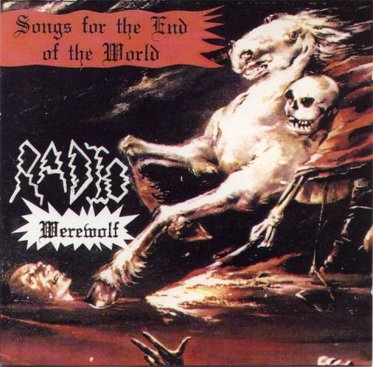 Radio Werewolf begin working on The Norse Eddas shortly before 8-8-88 Zeena: In Summer of '88, a couple of months after we'd met, Nikolas mentioned that he and Kirby were planning on doing an album of the Norse Eddas. Nikolas Schreck: …on rehearsing the adaptation of the Elder Edda, which formed the centerpiece of Radio Werewolf's second album Songs For The End Of The World. Zeena: He said, “I'm looking for a strong woman to play the role of a Valkyrie and you just might be the one I've been looking for.” Nikolas Schreck: Her artwork and creative writing, which she read to me, and her skills as an improvisatory keyboard player with a gift for haunting medieval melodies, her experience in theater as ritual, these were the many things we had in common as far as the mutual artistic approach that blossomed into our collaboration in the next phase of Radio Werewolf. Zeena: He knew I'd done theater pieces and had acting experience, and asked if I'd be interested. Now, the funny thing is, between '87-88, I'd been having a pleasant dalliance with King Diamond. Right around the time Nikolas asked me to participate in the Eddas recording, Kind Diamond said he'd like to find a way to bring me on tour with him but in order to do that, he would have had to work me into his act to justify my travel expenses. At that time, King Diamond had a stage act that involved a haunted house story with a scary old grandmother character and he asked if I'd consider wearing a latex mask to play the grandmother. Well, given the choice between playing a Valkyrie or playing an old grandmother in a latex mask, which would you choose?! (laughs) So obviously Nikolas, Kirby and I began working on what would become Songs For The End Of The World fairly early on. We were artists who would’ve collaborated as equals on something anyway, regardless of whether or not we got romantically involved, and regardless of Nikolas's then involvement with the first cast of Radio Werewolf. […] 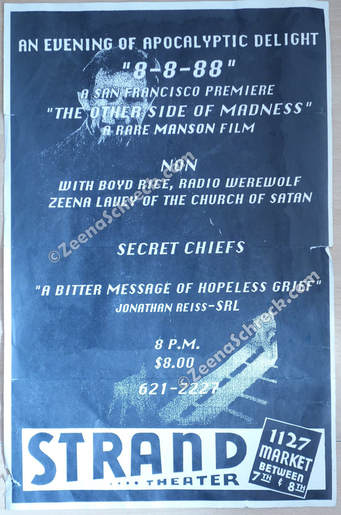 8-8-88 rally at Strand Theater SF Nikolas Schreck: Then in August, the 8-8-88 concert happened, the anniversary of the Manson murders. Zeena came to San Francisco from LA at my invitation, to do a reading at this concert to which Boyd Rice and I had agreed to several months before. Zeena: I was supposed to arrive at the venue with Boyd and Adam Parfrey. I wanted to get there a little early, as I usually do, but they wanted to wait until the last minute and opted instead to kill time eating dinner in Japan Town. Meanwhile, Nikolas and his girlfriend were still running around getting everything together for the performance, obviously with no help from the three of us. Zeena: The 8-8-88 rally was the only time the old line up of Radio Werewolf and the yet-to-be new line up of Radio Werewolf worked together. It would be the only performance that Nikolas, the original percussionist Wilhelm, and I ever performed live together. That marked the transition point spanning three phases of Radio Werewolf: 1) the Nikolas Schreck/Evil Wilhelm collaboration, 2) the solo Nikolas Schreck/The Fiery Summons, and 3) the Nikolas Schreck/Zeena collaboration. [...] Zeena: During the performance my cue was a particular organ chord that Nikolas would play; Boyd's part came before mine and when Nikolas played the cue Boyd was to step away from the podium to make room for the next in the line-up, me. When the time came for my part Boyd just stood there, I kept looking around wondering when he'd get it, his part was finished, but he stood there an interminably long time, just sort of zoning out. Judging by Boyd's and Adam's jitteriness that they expressed at dinner over the Geraldo crew filming it, I think that must have been what panicked him, they weren't yet used to that level of national attention. Nikolas Schreck: When the Geraldo Rivera [U.S. TV show] film crew had arrived at the theater they asked me in all seriousness if they could film my Satanic wedding ceremony with Zeena LaVey; they were very disappointed when I told them there was no such wedding planned! Zeena: Because of Boyd's stage fright, it left me about half the time I needed for what we'd planned for me to read…so I just hurriedly did my part and moved on. It was also tense during the performance because shortly before we went on, we learned of a call-in threat from someone with the intention of stabbing the participants on stage with syringes filled with AIDS infected blood. […] Zeena: I was not at all comfortable with the atmosphere immediately after the show and wanted to immediately leave, as was the original agreement. There was supposed to be a car waiting for me, which never materialised so I was stuck in the backstage area with a bunch of dips wanting to ape for the camera. There were some group photos taken and if you notice I'm at the far outer end…why? Because I didn't even want to be in the photos at all. I was the only one standing off to the side watching the others take photos but the ‘Anton LaVey fan-club’ all whined that I should be in the photos with them and that's why I'm actually half in, and half out, of those shots.
Nikolas Schreck: Me and Wilhelm gave an interview to Geraldo, and if you watch the interview you can already see the tension that comes across from us sitting together. Evil Wilhelm: During the show I looked around in disgust and said “this is just not fun anymore…”. Zeena: You could cut the tension with a knife, because on the one end of the spectrum you had these goofy newcomers to the CoS, getting off on their 15 minutes of media high, and then on the other end of the spectrum you had this silently smouldering Radio Werewolf drama between Wilhelm and Nikolas unfolding behind everyone else's drunken giddiness…as for me, I just wanted to go home. Fastforward 30 Years Zeena: Although we haven't collaborated on musical projects since Radio Werewolf ended in 1993, there are still a lot of similarities in theme and content to what we both do. Nikolas Schreck: These days, Zeena and I focus on solo performances and individual writing/art projects; we purposely don't attend each others' gigs for a variety of practical reasons, mostly having to do with maintaining respect for each artists' autonomy, and to dispel the moronic ‘Mommy and Daddy of Satanism’ idea which originated primarily from both the US Fundamentalist Christian AND Satanic factions. Zeena: We live and work entirely independently of each other these days. On a practical level, we learned long ago that it's very difficult for two very focused artists, who are always working on a continuous stream of projects, with unpredictable schedules, to attempt to live any sort of conventional co-habitation or ‘coupledom’ lifestyle. In addition to that, I've taken Buddhist Bodhisattva vows and am a yogini, which also necessitates specific ways of living. Nikolas Schreck: I’m flattered that [more than] thirty years after I started [Radio Werewolf] people are still enthusiastic and excited about it. I saw from the beginning that it’s something beyond…I can’t get away from it, but it isn’t ‘me’; I feel like I have a younger twin brother who did all this stuff and I have to deal with the consequences, that it’s like a child I brought into the world and I have to accept the responsibility of it. Zeena: For me, the most powerful, valuable and enduring lesson of all that came out of my Radio Werewolf years is the message of our final album: Love Conquers All. [End of excerpt] The Occult Influences of Sympathy for the DevilDen of Geek online journal explores the mystique and back stories of the 1968 cult anthem Sympathy for the Devil, by The Rolling Stones in this in-depth article. Exclusive interview with Zeena throughout the article, recalling her first-hand experiences with and magical interpretations of the song and its influences (excerpted in parts below: Full article, HERE and again at end of this post): Zeena Schreck, a Berlin-based interdisciplinary visual and musical artist told Den of Geek [...] “I'm sure they didn't mind the controversy that came with the dark associations from 'Sympathy,' or the previously released 'Their Satanic Majesties Request.' I'd think the more sinister reputation would have been, for the Stones, a welcome delineation from the 'I-wanna-hold-your-hand’ Beatles [...] generally, it seemed they were tapping into the overall Zeitgeist of the times, of the overwhelming pop-culture focus on occultism, witchcraft, and Satanism,” Zeena explains. “Specifically, the theme of that song seemed more a literary reference, influenced by the Russian novel The Master and Margarita by Bulgakov. I doubt there were any intentional sinister motivations.” Rock has been called the devil’s music since it began to roll. This is both overt bigotry and inferred spiritual racism. There must be real power in those jungle beats that pump out real magic. “Possibly one of the reasons that particular song developed such an aura surrounding it is due to the consistent, shamanistic-like percussion and chanting,” says Zeena. “The quality of the rhythm in ‘Sympathy’ is similar to magical drumming played to induce trance states. That type of hypnotic rhythm is a traditional method of inducing altered states of consciousness. Combine that with the copious amounts of drugs and psychedelics that everyone was taking those days, while invoking a (conventionally understood) malevolent force, then obviously the effects would be quite epic.” Invoking a Demon Brother: “Sympathy for the Devil” was captured in two takes, the first one Richards declared a disaster, before hitting on the perfect alchemy. The recording was filmed by French new wave film icon Jean-Luc Godard, who renamed his film One Plus One in honor of it for its 1968 producer’s cut. During the five days of recording, as the stories go, a film lamp started a fire that laid waste to the band’s equipment. The tapes were protected, another clue to the possessed nature of the noise. The band’s mythic satanic alliance was further cemented by their association with American underground filmmaker Kenneth Anger, a former child actor who wrote the tell-all book Hollywood Babylon. Anger was a Crowleyan who called his movies Inauguration of the Pleasure Dome, Scorpio Rising, and Fireworks “visual incantations” and “moving spells.” Jagger played the synthesizer soundtrack for his Invocation of My Demon Brother. Jimmy Page of Led Zeppelin scored one on Crowley. Anger met the Stones through art gallery owner Robert Fraser and asked if they would work on a film called Lucifer Rising. Anger wanted to cast Mick as Lucifer and Keith as Beelzebub. Zeena says that, during the 1960s and 1970s, the filmmaker “transmitted the influences of Curtis Harrington, Jean Cocteau, and Maya Deren [to her],” adding that her own art “was influenced early in life by the mentorship of her godfather Kenneth Anger.” During her childhood and adolescence, Zeena “was privy to Anger's conversations about his involvement with such contemporaries as the Rolling Stones, Jimmy Page and Anita Pallenberg.” “Occasionally Kenneth Anger would mention his involvement with the members of the band,” Zeena says. “When the subject came up, he'd say they'd brought destructive energies upon themselves. Ironically he, himself, helped facilitate that, being their magical mentor. Despite the Stones' backing off from the 60s’ dark occult influences around them, there can be no denying that Anger was a strong influence for a time, as witness Jagger's soundtrack for Invocation of my Demon Brother.” But Zeena, who was teaching magic and sorcery at the age of 16, “never agreed with Kenneth's admiration and proselytizing of Aleister Crowley and Thelema. It's a very destructive and misogynistic philosophy which has brought a lot of harm to people who take it seriously.” Zeena severed ties with her father and his Church, and is now a teacher of Tibetan Tantric Buddhism, where the music of the Rolling Stones is more welcome. “Although Kenneth Anger was befriended with both the Rolling Stones and my father during the same years, you definitely would not hear ‘Sympathy for the Devil’ playing at Church of Satan headquarters,” Zeena says. “The simple reason is that the High Priest had very rigid, idiosyncratic interpretations of what he considered ‘satanic music.’ Rock music, heavy metal, or any other kind of popular music, were definitely not part of his satanic jukebox.” The British band might also have stopped dropping quarters into the American director’s nickelodeon. “Kenneth Anger they thought laughable,” Faithfull wrote in her memoirs. “Mick and Keith were utterly contemptuous of his satanic hocus-pocus.” “However, a more direct magical influence, aside from Kenneth Anger, influencing the group during the making of 'Sympathy for the Devil', would have more likely been Anita Pallenberg,” Zeena says. “She openly practiced black magical rituals and never hid her fascination for the darker side of life. She not only performed backing vocals but also had a creative influence on the music and style of the group, being their sort of 'resident witch.' I know one of Pallenberg's cousins who confirmed she was always into the black arts and a little 'witchy.’” Because Swinging London in the '60s only really ranged a few blocks, both the Rolling Stones and the Beatles were loosely connected to the sixties counter-spiritual group, the Process Church of Final Judgement, but mainly because they all went to Pink Floyd shows. “The Stones' playing with popular satanic themes and imagery may have begun superficially at first but ultimately a malignant seed was planted and the conditions for destructive consequences ripened,” Zeena says, referencing another tragedy that played into the song’s morbid mythology.
The legend of the “Sympathy for the Devil” took more sinister turn during the Altamont Free Concert in 1969. Though Meredith Hunter was killed by Hell’s Angel’s bikers who were working security while the band was playing "Under My Thumb," the fight that killed him interrupted the band as they kicked into their rhythmic satanic anthem. "We're always having—something very funny happens when we start that number," Jagger said before the band restarted the number. Because of the public outrage, the Stones didn’t play the song live for the next seven years. Brian Jones was played out during the recording of Beggars Banquet, but he was not silent. Richards worked double and triple duty, but Jones did the wonderful slide work in “No Expectations,” and played the sitar and tanpura on "Street Fighting Man." The album would be the last with Jones, who was discovered drowned in his Sussex swimming pool on July 26, 1969. His own musical exploration propelled the band to take the lead in many major musical movements. “Speaking only for my years composing with Radio Werewolf, I wouldn't say ‘Sympathy’ or Satanic Majesties Request had direct influence on my music within Radio Werewolf,” Zeena says. “But I did have a strong affinity with their music produced in the Brian Jones years - their music when it had a more medieval flavor. That sound is what I'm naturally drawn to and often create.” 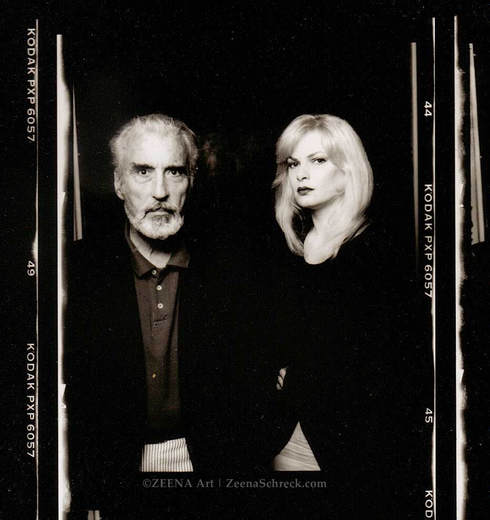 The Chiseler Online Magazine interviewed Zeena about her memories of actor Christopher Lee: The interdisciplinary avant garde artist spoke exclusively with the Chiseler about the legendary actor. Zeena “met Christopher Lee as a result of being co-producer for the CD ‘Christopher Lee Sings Devils Rogues and other Villians.’ Specifically, I first met him at the apartment in Los Angeles that Nikolas and I rented for him and his wife Gitte to stay in while we worked on the recording of ‘Christopher Lee Sings Devils Rogues and other Villains.’ ” Long before Lee recorded with the symphonic power metal group Rhapsody of Fire, he was involved with “Christopher Lee Sings Devils, Rogues & Other Villains (From Broadway To Bayreuth And Beyond).“ “Nikolas knew of Lee’s love of classical music, opera and Broadway musicals. But at that time, the general public only knew Lee for his vampire roles and had little awareness of his musical talent and appreciation,” Zeena explained. Lee maintained that his one regret was his decision not to become an opera singer. “Nikolas conceived of the idea to spotlight Christopher Lee’s considerable singing talents,” Zeena said. “But he knew that to do that effectively, such a project would need to focus on musical selections one would automatically think of Lee singing, appropriately sinister villainous characters from Opera and musicals. “Lee was very enthusiastic at the proposal. So it was through helping Nikolas with the planning, production and coordinating of that project that I got to know Christopher. We recorded it at a studio in Crossroads of the World in Los Angeles. A considerable amount of work and expense went into finding suitable, classically trained musicians and a musical director (Dean Shepherd, who was fantastic) who had the right skills and temperament to work well with Lee.” The friendship endured long after the work was completed. “We stayed in contact throughout the years following that album,” she said. “We’d see him whenever he was in Berlin for the Berlin Film Festival and the ‘Cinema for Peace’ benefit.” [...] “It goes without saying that Christopher was a very colorful person,” Zeena said. “But for me, the most interesting conversations with him revolved around his descriptions of his WWII work as a British Intelligence officer. He talked about parachuting into German enemy Waffen SS camps and, well, he did what the British government trained him to do, which was not pretty.” “I got the impression he was still rather haunted, even decades later, by some of his experiences during the war. Even though he believed that what he did was for virtuous and just reasons,” she added. [...] “He definitely had an interest in magic beyond the roles he played,” Zeena said. “But we need to make a distinction between 'interest’ and 'involvement.’ He had no first-hand involvement in any magical, occult or satanic groups and even declined direct invitations from such groups. “He liked horror fiction of authors like H.P. Lovecraft, Bram Stoker, Algernon Blackwood, etc. But that was purely a literary appreciation. He also had an interest in John Dee, The Golden Dawn and other 19th and early 20th century magical groups,” she explained. “However, it should be stated that Lee had an interest in a wide variety of eclectic subjects, which had nothing to do with occultism. He was simply very well-read and inquisitive by nature,” she added. Lee was in the enviable position to be able to satisfy his many curiosities. “As a result of his years in British intelligence, he’d known figures like Dennis Wheatley, his cousin Ian Fleming, etc., and had heard of their experiences with Aleister Crowley. In fact he was lifelong friends with Dennis Wheatley and agreed with Wheatley’s views on the occult. But their friendship grew out of their mutual intelligence work, not because of occult or magical interests. Christopher Lee was instrumental in getting Wheatley works to film. Wheatley’s The Forbidden Territory was made into a movie starring Ronald Squire as Sir Charles rather than Duke de Richleau in 1934. “It was Lee who convinced Hammer films to buy the rights to Wheatley’s books for the films he would star in,” Zeena said. “But it should be clarified that Lee was very dismissive and wary of occultists, black magicians or satanists.” During Zeena’s involvement in the Lee album, she had the opportunity to ask Lee about the rumor that her father knew Christopher Lee. “When Nikolas and I got to know Lee, we were able to discuss this rumor with him in detail,” Zeena said. “Both Lee and his wife Gitte refuted the rumor vehemently. Lee explained that, as a result of working on the U.S. TV movie Poor Devil, with Sammy Davis, Jr. (who became a Priest in the Church of Satan), Davis tried to ingratiate Lee into accepting an invitation at the behest of my father, offering Lee a copy of The Satanic Bible, personally inscribed and signed by my father. “Lee still had the book in his collection and, on one of Nikolas’s visits to London for preparations of the CD, Lee showed Nikolas the book referring to it as a cheap paperback from the '60s witchcraft fads. Lee didn’t take it at all seriously,” Zeena said. “His wife Gitte recalled another time they visited Sammy and his wife Altovise in Los Angeles, when again Sammy tried to serve as middle-man between Dracula and the Black Pope, and again to no avail. “Lee had no interest. He said Sammy was nuts about my father but Lee saw my father as a 'Johnny-come-lately opportunist and con-man’ within the occult. Lee expressed that he had no intention of ever meeting LaVey. Then, Lee pointedly looked me in the eye and said 'I’m very glad that you had the sense to get out of all of that destructive rubbish, expounding on what he called the ruinous effects of that type of belief system,’ ” she concluded. The levelheaded enchantress also got to see the work that went into his actor’s preparation. “Lee took personal responsibility to research his roles, to learn what he could about the characters and the historical context, in order to bring a more believable performance to each character,” Zeena said. “His interest in devilish and monstrous roles was purely a matter of aesthetics and literary appreciation - but not at all a personal lifestyle. “I think he considered the villainous roles he played as having allegorical and moral significance. Sort of like morality tales for a new generation. I don’t think he expected to actually inspire people to want to become the characters he played. He was part Italian and had a very strong sense of religious moral ethics. So even though he befriended Wheatley and personally researched the villainous roles he would play, it was really out of a dedication to portray those roles in as real a way as possible, to understand those characters from their own points of view and to make them believable,” she said. THERE'S MORE TO THE ARTICLE - READ THE FULL INTERVIEW HERE 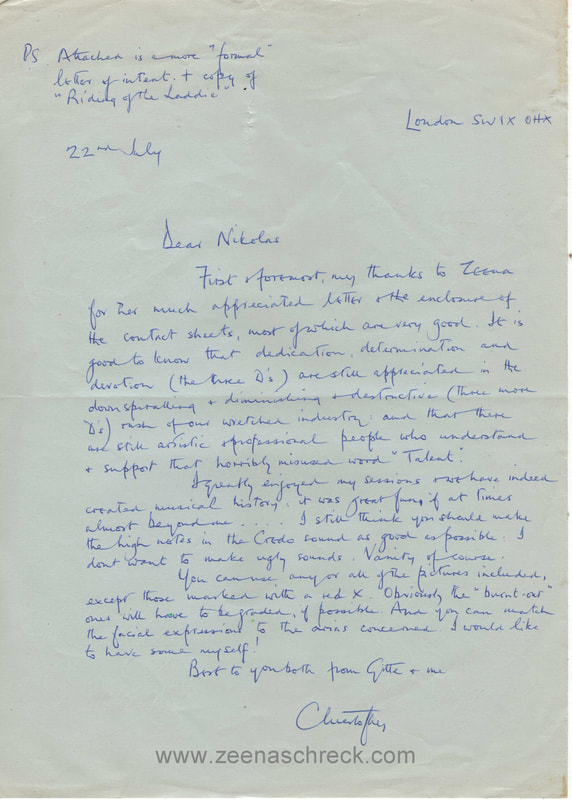 Christopher Lee letter from 22nd of July [1996] "Dear Nikolas, First & foremost, my thanks to Zeena for her much appreciated letter & the enclosure of the contact sheets [photos for the CD], most of which are very good. It is good to know that dedication, determination and devotion (the three D's) are still appreciated in the downspiralling & diminishing & destructive (thee more D's) rush of our wretched industry; and that there are still artistic & professional people who understand & support that horribly misused word “Talent.” I greatly enjoyed my sessions & we have indeed created musical history, it was great fun, if at times almost beyond me....I still think you should make the high notes in the Credo sound as good as possible. I don't want to make ugly sounds. Vanity of course. You can use any or all of the pictures included, except those marked with a red X. Obviously the “burnt out” ones will need to be graded, if possible. And you can match the facial expressions to the arias concerned. I would like to have some myself! Best to you both from Gitta & me, Christopher" San Francisco is currently celebrating the 50th anniversary of the Summer of Love. This week also marks the dark-side of the city's history. On May 23, 1967 Zeena made her international debut as performance-artist at the first public satanic baptism, orchestrated by her parents' in-house carnival show. She has commemorated the event by creating a personally charged meditative ritual in the form of a soundscape and video collage. [Video below] |
SUPPORT FOR WORKS IN PROGRESS
Zeena is an entirely independent, self-funded artist. Her livelihood and funding for creative projects rely solely on commissioned artwork, teaching and lecturing engagements, performances and purchases of her products and music, as well as from donations from private patrons and sponsors. If you would like to pledge your support towards the production costs of current works in progress, please use the PayPal donation button at the top of page. Thank you for your support of Zeena's work! Archives
May 2024
Categories
All
|
Zeena's Bandcamp page |
Copyright ©2024 Zeena Schreck. All rights reserved.
|

